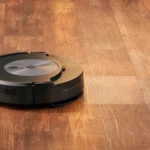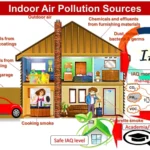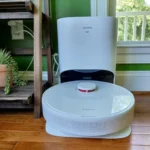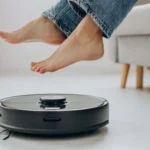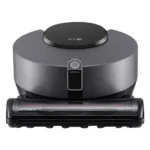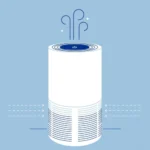Introduction to HEPA Filtration for Pet Hair
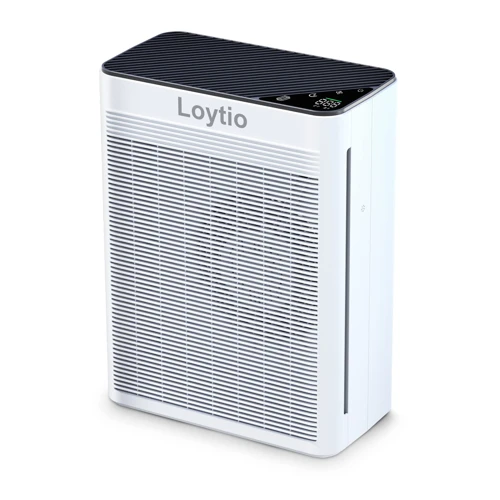
Are you tired of constantly battling pet hair in your home? Do you find yourself sneezing or experiencing allergies due to pet hair and dander in the air? Look no further than HEPA filtration. HEPA, which stands for high-efficiency particulate air, is a type of filtration system that can drastically improve the air quality in your home by trapping and filtering out small particles, including pet hair and dander.
In this guide, we will cover everything you need to know about HEPA filtration and how it can make a difference for pet owners. We will discuss the benefits of using HEPA filtration, as well as tips for choosing the right smart vacuum cleaner with HEPA filtration. We’ll also provide a selection of top smart vacuum cleaners to consider.
Before we dive into the details, it’s important to note that not all vacuum cleaners come with HEPA filtration. Selecting the right one for your home and pet needs is essential in ensuring that the air quality in your home remains healthy and free from pet hair and dander. By reading this guide, you will have a better understanding of HEPA filtration and the right vacuum cleaner for you.
To learn more about the best vacuums for pet hair, check out our top 5 vacuums for pet hair guide. If you’re interested in comparing smart vacuums for pet hair, take a look at our best smart vacuums for pet hair comparison. For pet owners who suffer from allergies, our guide on smart vacuum picks for pet allergies may be of interest. If you’re looking for a self-cleaning vacuum for pet owners, read our guide on self-cleaning vacuums for pet owners.
Now, let’s dive into the world of HEPA filtration and how it can help keep your home free from pet hair and dander.
What is HEPA Filtration, and How Does it Work on Pet Hair?

HEPA filtration is a technology used in air purification systems and vacuum cleaners to remove small particles and allergens from the air. The acronym stands for High-Efficiency Particulate Air, which means it can remove particles as small as 0.3 microns with 99.97% efficiency.
When it comes to pet hair, HEPA filtration is effective because it can capture the fine hairs and dander that easily become airborne. Pet hair contains tiny particles that can trigger allergies and respiratory issues in people, so it’s important to choose a vacuum cleaner with HEPA filtration if you have pets.
HEPA filtration works by relying on a dense mat of fine fibers that trap particles as air flows through the filter. The filter is made of very thin fiberglass fibers woven into a mat, and as air flows through the mat, particles stick to the fibers. The fibers are so thin that they can trap even the smallest particles, including pet hair and dander.
When air flows through the HEPA filter, the fine particles and pet hair become trapped, so they don’t re-enter the air. This helps improve the air quality in your home and reduces the allergens and irritants that can cause health issues for you and your pets.
A vacuum cleaner with HEPA filtration can also help prevent pet hair clogs. As pet hair and dander get sucked into the vacuum, they can accumulate in the filter and cause clogs. A HEPA filter can remove these particles from the air stream and trap them in the filter, reducing the risk of clogs and keeping your vacuum cleaner running more efficiently.
HEPA filtration is an essential technology for pet owners who want to keep their homes clean and healthy. By capturing fine pet hair and dander, a vacuum cleaner with HEPA filtration can help reduce allergens and improve air quality, making it easier to breathe and enjoy your home.
What is HEPA Filtration?
Have you ever heard someone talk about HEPA filtration and wondered what it actually means? HEPA stands for High Efficiency Particulate Air, and it refers to a type of filter that captures microscopic particles floating in the air. These particles can include pet dander, hair, dust, and other allergens that can worsen respiratory conditions. HEPA filters are made from mesh-like materials that trap these particles as they pass through, leaving behind cleaner air. But how exactly does this method work, and why is it so effective for pet hair? Let’s dive deeper into the science behind HEPA filtration.
How HEPA Filtration Works with Pet Hair
HEPA filtration is an effective way to deal with pet hair in your home. When it comes to pet hair, HEPA filtration works by using a three-step process.
First, the pre-filter captures the larger pet hair particles. These larger particles can cause the vacuum to clog or slow down, which is why it’s important to capture them before they reach the main filter.
Then, the main filter comes into play. Made of HEPA material, the filter captures the smaller pet hair and dander particles, as well as any other allergens present in the air. This is where the true power of HEPA filtration comes in.
Finally, the activated carbon filter captures any remaining odors or chemicals in the air. This is important if you have pets that tend to leave a strong odor in your home.
All three steps work together to provide clean air in your home, free from pet hair and other allergens that can affect your health. With strong suction power and multiple filtration stages, vacuum cleaners with HEPA filtration are effective at capturing even the smallest particles of pet hair and dander that can cause allergic reactions in some people.
But how exactly does HEPA filtration capture these particles?
HEPA filters work by using a combination of three different mechanisms to trap particles with varying sizes. These mechanisms include interception, impaction, and diffusion.
Interception involves particles getting caught in the fibers of the filter as they pass through. Impaction happens when larger particles collide with the filter fibers and get trapped. Finally, diffusion occurs when smaller particles collide with air molecules and get bounced around, eventually colliding with the filter fibers and sticking to them.
All three mechanisms help HEPA filters trap particles as small as 0.3 microns in size with a 99.97% efficiency. This is why HEPA filtration is recommended for those who suffer from allergies and other respiratory issues caused by pet hair and dander. By removing these allergens from the air, HEPA filtration can help keep both you and your furry friends healthy and happy.
To better understand how HEPA filtration works with pet hair, check out the table below:
| Mechanism | Particle Size | Efficiency |
|---|---|---|
| Interception | Larger particles | High |
| Impaction | Larger particles | High |
| Diffusion | Smaller particles | High |
HEPA filtration is an effective solution for managing pet hair in your home. By capturing even the smallest particles of pet hair and dander, HEPA filters can help reduce allergic reactions and improve overall air quality.
Benefits of Using HEPA Filtration for Pet Hair
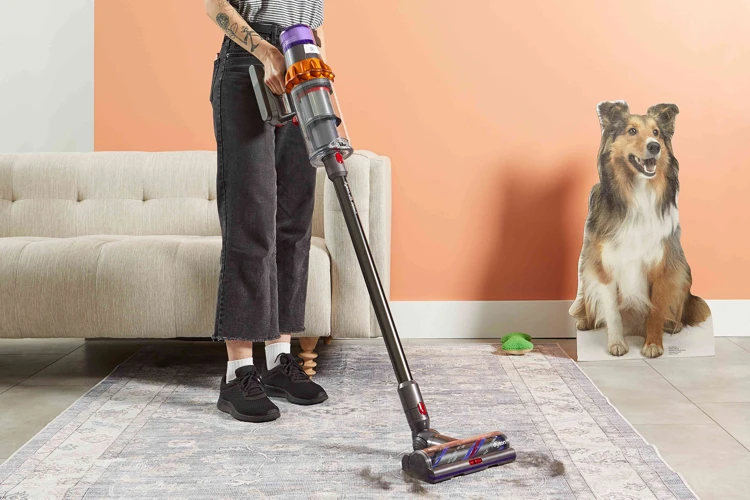
Using HEPA Filtration for Pet Hair: Understanding the Benefits
When it comes to cleaning up after your furry friends, pet hair can be a constant challenge. Not only can it be unsightly, but it can also trigger allergies and affect the air quality in your home. Luckily, using a vacuum cleaner with HEPA filtration can significantly reduce the impact of pet hair in your household. In this section of the article, we delve into the key benefits of using HEPA filtration for pet hair, including:
Reduces Allergens and Airborne Pet Hair
One of the primary benefits of using HEPA filtration for pet hair is that it can help reduce allergens and airborne pet hair. HEPA filters can trap 99.97% of particles that are 0.3 microns or larger. This means that tiny pet hair particles and dander are trapped and prevented from circulating in the air. This, in turn, reduces the chances of allergies and respiratory issues caused by pet hair.
Improves Air Quality
HEPA filtration can also significantly improve the air quality in your home. Since pet hair can carry dust, dirt, and other debris, it can contribute to poor indoor air quality. By using a vacuum cleaner with HEPA filtration, you can significantly reduce the amount of pet hair and other particles in the air, leading to cleaner, fresher air for you and your family to breathe.
Can Help Prevent Pet Hair Clogs
Pet hair is notorious for clogging vacuum cleaners, especially those with weaker suction power. This can cause frustration and reduce the effectiveness of your cleaning efforts. However, by using a vacuum cleaner with HEPA filtration, you’re not only reducing the amount of pet hair scattered around your home, but you’re also decreasing the likelihood of clogs in your vacuum.
Using a vacuum cleaner with HEPA filtration can help reduce allergens and airborne pet hair, improve indoor air quality and prevent pet hair clogs in your vacuum. These benefits can make a significant difference in the health and comfort of you and your family, particularly for those with allergies or respiratory conditions.
Reduces Allergens and Airborne Pet Hair
For many pet owners, allergies and airborne pet hair can be a major concern. It’s not uncommon to find yourself constantly sneezing or dealing with itchy eyes when you’re around your furry friend. However, with the right HEPA filtration system in your home, you can drastically reduce these allergens and keep them from circulating in the air. Using a quality smart vacuum cleaner with HEPA filtration can make a world of difference in the air quality of your home and help keep your allergies at bay. Let’s explore the benefits of HEPA filtration for pets in more detail.
Improves Air Quality
Using HEPA filtration can greatly improve the air quality in your home – not just for pet owners, but for everyone! Here are some ways that HEPA filtration can help improve air quality:
- Removes tiny particles: HEPA filters are designed to capture particles as small as 0.3 microns, which includes pet hair, pet dander, pollen, and other allergens. By removing these particles from the air, HEPA filtration can help reduce asthma and allergy symptoms, as well as other respiratory issues.
- Traps odors: Pet hair and dander can often produce unpleasant odors, especially if your pet spends a lot of time indoors. HEPA filters can help trap these odors and prevent them from lingering in the air.
- Reduces dust: Pet hair and dander can also contribute to the amount of dust in your home. By capturing these particles with HEPA filtration, there will be less dust circulating in your air, which can also help reduce respiratory issues and keep your home cleaner overall.
- Decreases the spread of pet hair: When pet hair is allowed to float around in the air, it can quickly settle onto furniture, clothing, and other surfaces. By removing these particles from the air with HEPA filtration, there will be less airborne pet hair to spread around your home.
Using a vacuum with HEPA filtration can greatly improve the air quality in your home, making it a healthier and more comfortable environment for both you and your pets.
Can Help Prevent Pet Hair Clogs
One of the major benefits of using HEPA filtration for pet hair is that it can help prevent pet hair clogs in your vacuum cleaner. Pet hair can be extremely problematic for vacuum cleaners, as it tends to get tangled and clog the machine, reducing its suction power and overall performance.
To understand how HEPA filtration can prevent these clogs, it’s important to know how traditional vacuum cleaners work. Most vacuum cleaners use a motorized brushroll to loosen dirt and debris from carpets and upholstery, and suction power to collect it. However, this design can make it difficult for vacuum cleaners to pick up pet hair, which tends to cling to surfaces and get tangled in the brushroll.
HEPA filtration can help solve this problem by using a specialized filter that captures pet hair as it passes through the machine. Most HEPA filters are designed to capture particles as small as 0.3 microns, including pet dander and other allergens. This means that the filter can capture even the smallest pieces of pet hair, which helps prevent it from clogging up the brushroll or other parts of the machine.
To illustrate the effectiveness of HEPA filtration in preventing pet hair clogs, let’s take a look at a comparison chart below:
| Traditional Vacuum Cleaner | Vacuum Cleaner with HEPA Filtration | |
|---|---|---|
| Pet Hair Collection | Pet hair can get tangled in brushroll and clog machine | HEPA filter captures pet hair, preventing clogs |
| Suction Power | Suction power can be reduced by pet hair clogs | HEPA filter prevents clogs and maintains suction power |
| Allergen Reduction | May not capture small particles like pet dander | HEPA filter captures particles as small as 0.3 microns, including pet dander |
As you can see, a vacuum cleaner with HEPA filtration can be much more effective at preventing pet hair clogs than a traditional vacuum cleaner. This can lead to improved performance, longer machine life, and a better overall cleaning experience. So, if you have pets and want to keep your home clean and free of pet hair, be sure to choose a smart vacuum cleaner with HEPA filtration.
Choosing the Right Smart Vacuum Cleaner with HEPA Filtration
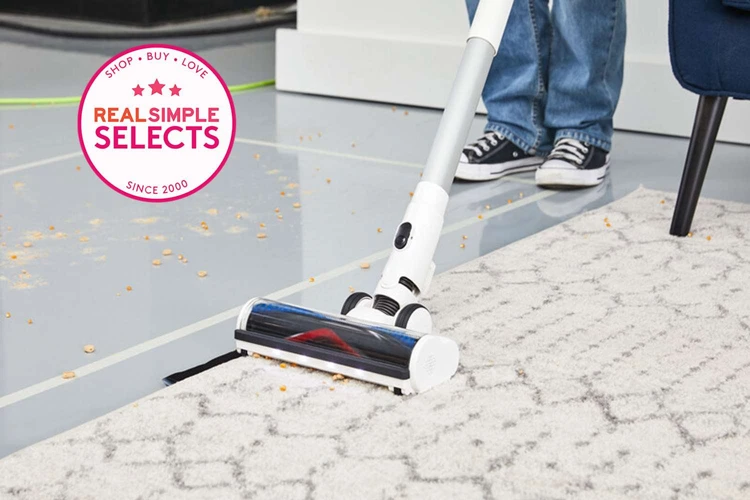
When it comes to choosing the right smart vacuum cleaner with HEPA filtration for pet hair, there are a few important factors to consider. Here are some tips to help you make the best decision for your home and furry friends.
Consider your Home and Pets’ Needs: Before purchasing a vacuum cleaner, think about the size of your home and the type of floors you have. If you have a large house with multiple levels, you might want to consider a cordless or lightweight option that is easy to move around. Additionally, if you have pets that shed frequently or have long hair, you will need a vacuum cleaner with powerful suction abilities to pick up any pet hair and dander.
Look for HEPA Certification and Suction Power: When shopping for a vacuum cleaner, make sure to look for HEPA certification. This label indicates that the vacuum cleaner uses high-quality filtration that can remove small particles of dust and allergens from the air. Additionally, pay attention to the suction power, as this will determine how well the vacuum cleaner can pull pet hair and debris from floors and carpets.
Choose a Vacuum with HEPA Filtration and Other Pet-Friendly Features: In addition to a HEPA filtration system, look for other features that will make cleaning up after your pets easier. For example, some vacuums come with pet hair attachments or brushes designed specifically for picking up pet hair on furniture and stairs. Others have larger dust cups or self-cleaning capabilities, which can save you time and hassle.
Choosing a smart vacuum cleaner with HEPA filtration can be a smart investment for pet owners. Not only will it help keep your home clean and free of pet hair, but it can also improve the air quality, which can be particularly important for individuals with allergies or respiratory problems.
Consider your Home and Pets’ Needs
Before choosing a smart vacuum cleaner with HEPA filtration for pet hair, it’s important to consider your home and pets’ specific needs. Every home and pet is unique, and the type of vacuum you choose will depend on a variety of factors. Should you go for a handheld option or a full-sized vacuum? Do you have a large or small home? Are you dealing with shedding from a single pet or multiple pets? These are just a few of the questions you’ll need to ask yourself as you navigate the market for pet-friendly vacuum cleaners. Let’s dive deeper into what factors you need to consider to make the best choice for you and your furry friends.
Look for HEPA Certification and Suction Power
When shopping for a smart vacuum cleaner with HEPA filtration for pet hair, there are a few key factors you should consider to ensure you’re getting the best product for your needs. Two important factors to look for are HEPA certification and suction power.
Here are some tips to keep in mind when looking for a vacuum cleaner:
- HEPA Certification: When looking for a vacuum cleaner with HEPA filtration, make sure that it is HEPA-certified. This means that the vacuum has been tested and meets the standards for high-efficiency particulate air (HEPA) filtration, which is typically able to capture 99.97% of particles as small as 0.3 microns. Look for a vacuum with a HEPA filter that is easy to remove and clean or replace.
- Suction Power: A vacuum cleaner’s suction power is an important factor to consider when dealing with pet hair. Look for a vacuum with strong suction power to effectively pick up hair and debris. You should also look for a vacuum with adjustable suction power so you can customize it to your needs.
- Other factors that could affect suction power include the vacuum’s motor and brush roll. Some vacuums may have a motorized brush roll designed specifically to pick up pet hair, and others may have a stronger motor for more powerful suction.
- Filtration Type: While HEPA filtration is generally the best option for capturing pet hair and allergens, you may also want to consider other filtration options such as activated carbon, antimicrobial, or washable filters. These additional filtration options can help to reduce odors and bacteria in addition to capturing pet hair and dander.
- Additional Features: In addition to HEPA filtration and suction power, you may want to look for other features that can make cleaning up pet hair easier. For example, some vacuums come with specialized pet hair tools, such as crevice tools, upholstery brushes, or motorized pet hair brushes. You may also want to look for a vacuum with a large dustbin or a self-emptying feature to minimize the need for frequent emptying.
By keeping these factors in mind when shopping for a smart vacuum cleaner with HEPA filtration and strong suction power, you can ensure that you get a product that is specifically designed to tackle pet hair and keep your home clean and allergen-free.
Choose a Vacuum with HEPA Filtration and Other Pet-Friendly Features
When choosing a vacuum cleaner to deal with pet hair, it is essential to look for HEPA filtration and other pet-friendly features to ensure efficient and safe cleaning. Here are some key factors to consider when shopping for a vacuum cleaner:
| Feature | Description |
|---|---|
| HEPA Filtration | A vacuum cleaner equipped with a HEPA filter can trap pet hair, dirt, and dust as small as 0.3 microns, ensuring that indoor air quality is improved, and allergens are reduced. |
| Pet-Specific Attachments | Look for vacuums that come with specialized tools and attachments for pet hair removal. A crevice tool can help clean up tight spaces, a motorized brush roll can easily lift pet hair from carpets and upholstery, and an upholstery tool can gently remove pet hair from furniture. |
| Strong Suction | A vacuum cleaner’s suction power is also an important factor in removing pet hair. Choose models that have powerful suction to remove pet hair from furniture, carpets, and floors without leaving any stuck behind. |
| Large Dustbin Capacity | Pet hair, dirt, and debris can quickly fill up a vacuum’s dustbin; therefore, it is vital to choose a vacuum cleaner that has a large dustbin capacity to hold a lot of debris between emptying. |
| Smart Features | Some high-end vacuums come with a variety of smart features such as automatic docking, scheduling, and voice control via smart home assistants. These features can make cleaning convenient and effortless. |
| Quiet Operation | Sometimes, pet hair cleaning can be noisy, but modern vacuum cleaners feature sound suppression technology that produces less noise while cleaning. |
| Anti-Allergen Sealing | Some vacuum cleaners come with an anti-allergen seal that traps dust, dander, and other allergens inside the vacuum, so they are not released back into the air you breathe, making your home a safer place to live. |
By choosing a vacuum cleaner with HEPA filtration and pet-friendly features, you can easily and effectively remove pet hair from your home, keeping your family healthy and allergy-free.
Top Smart Vacuum Cleaners with HEPA Filtration for Pet Hair

When it comes to choosing a smart vacuum cleaner with HEPA filtration for pet hair, there are many options available in the market. To make it easier for you, we have researched and compiled a list of the top smart vacuum cleaners that excel in both suction power and HEPA filtration.
Dyson V11 Animal: This powerful cordless vacuum cleaner has a direct drive cleaner head that can tackle all types of pet hair, from fine fur to stubborn pet dander. The HEPA filtration system captures allergens and pollutants, making it a great choice for pet owners with allergies. With its powerful suction and versatile design, the Dyson V11 Animal is an excellent investment for pet owners.
iRobot Roomba i7+: This robotic vacuum cleaner is an ideal choice for busy pet owners who want to keep their floors fur-free without lifting a finger. The Roomba i7+ works wonders on pet hair and comes equipped with a HEPA filter that traps 99% of allergens, pollen, and dust. The iRobot Home app enables users to schedule cleaning, monitor the cleaning cycle, and view the map of their home, all from their smartphone.
Shark IQ Robot Self-Empty XL RV1001AE: This robotic vacuum cleaner boasts powerful suction and an XL capacity dust bin that minimizes the need for frequent emptying. Its self-cleaning brushroll effectively picks up pet hair, while the HEPA filter captures allergens, dust, and dander. Additionally, Shark IQ Robot maps out the user’s home and efficiently navigates around furniture and obstacles to provide thorough cleaning.
These top smart vacuum cleaners with HEPA filtration are designed specifically to tackle pet hair and to ensure clean air quality. By investing in one of these vacuum cleaners, pet owners can save a great deal of time and effort while enjoying the benefits of a fur-free home.
Dyson V11 Animal
When it comes to finding the right smart vacuum cleaner for pet hair, the Dyson V11 Animal is a top contender. With powerful suction and advanced filtration technology, this vacuum is designed to tackle even the most stubborn pet hair and allergens in your home. But what sets the Dyson V11 Animal apart from other vacuum cleaners on the market? Let’s take a closer look at its unique features and benefits.
iRobot Roomba i7+
The iRobot Roomba i7+ is a top-of-the-line smart vacuum cleaner that is perfect for pet owners who want a high-performance device to keep their homes clean. This advanced vacuum cleaner is equipped with HEPA filtration technology and comes with a variety of features that make it ideal for managing pet hair in your home.
One of the standout benefits of the iRobot Roomba i7+ is its ability to map and clean your home with precision. Using advanced sensors and mapping technology, this smart vacuum cleaner is able to navigate around furniture and other obstacles with ease. This means that it can effectively clean large and small rooms in your home without missing any spots.
In addition to its mapping capabilities, the iRobot Roomba i7+ also offers powerful suction that can pick up even the smallest pet hair and debris. This makes it an excellent choice for pet owners who want to ensure that their floors are free of pet hair and other allergens. Plus, with its HEPA filtration system, the iRobot Roomba i7+ is specifically designed to trap pet hair and dander, ensuring that your home is fresher and cleaner.
Another feature that sets the iRobot Roomba i7+ apart from other smart vacuum cleaners is its ability to dump the collected debris and pet hair into its own disposal base. This means that you won’t have to worry about emptying the dustbin manually, making the cleaning process even more convenient and efficient.
The iRobot Roomba i7+ also comes with a variety of other pet-friendly features, including a multi-surface rubber brush that is able to clean both carpets and hard floors. It also has a high-efficiency filter that captures 99% of allergens, dust, and dirt, making your home cleaner and safer for you and your pets.
If you’re looking for a smart vacuum cleaner that can effectively manage pet hair in your home, the iRobot Roomba i7+ is an excellent choice. Its powerful suction, HEPA filtration system, and advanced features make it an ideal device for any pet owner. Additionally, the vacuum also comes with a variety of accessories, such as boundary markers that allow you to customize the cleaning area as per your requirement.
| Features | iRobot Roomba i7+ |
|---|---|
| Mapping Technology | Yes |
| Powerful Suction | Yes |
| HEPA Filtration | Yes |
| Self-Emptying Base | Yes |
| Multi-Surface Rubber Brush | Yes |
| High-Efficiency Filter | Yes |
Shark IQ Robot Self-Empty XL RV1001AE
When it comes to choosing the right smart vacuum cleaner to help manage pet hair, the Shark IQ Robot Self-Empty XL RV1001AE is a popular choice.
HEPA Filtration: This vacuum cleaner features HEPA filtration to effectively capture 99.9% of dust, allergens, and pet dander as small as 1 micron. With this high level of filtration, pet owners can breathe easier knowing that their home’s air quality is being improved.
Self-Empty Base: A unique feature of the Shark IQ Robot Self-Empty XL RV1001AE is its self-empty base. This handy feature allows the vacuum cleaner to empty its own dust bin into the base, which can hold up to 30 days worth of dirt and debris. This means that pet owners can go for longer without having to empty the vacuum, making cleaning up after their furry friends even more convenient.
Powerful Suction: The Shark IQ Robot Self-Empty XL RV1001AE boasts powerful suction, which makes it ideal for picking up pet hair and other debris from carpets, hardwood floors, and other surfaces in the home.
Multi-Surface Cleaning: This smart vacuum cleaner is also designed for multi-surface cleaning, meaning it can easily transition from carpets to hard floors without losing suction or performance. This is important for pet owners who may have different types of flooring in their home.
Smart Navigation: The Shark IQ Robot Self-Empty XL RV1001AE is equipped with advanced smart navigation technology that allows it to map out the layout of a room and create a cleaning path. This ensures that it thoroughly cleans all areas of the room, including under furniture where pet hair and dust can collect.
The Shark IQ Robot Self-Empty XL RV1001AE is a solid choice for pet owners who want a smart vacuum cleaner with HEPA filtration, powerful suction, and convenient features like a self-emptying base. Additionally, its ability to clean multiple surfaces and smart navigation technology make it a valuable addition to any home.
Other Tips for Managing Pet Hair in Your Home
Managing pet hair in your home requires more than just using a vacuum cleaner. Here are some other tips and tricks to help you keep your home clean and free from pet hair:
Brush and Bathe Your Pet Regularly: Regular brushing and bathing can help to reduce the amount of loose hair on your pet. This means there will be less hair shedding around your home. If your pet has long hair, you may want to consider cutting it to a shorter length. This can help to reduce shedding too.
Use Furniture Covers and Wash Bedding Frequently: Using furniture covers on your sofa and chairs can protect them from pet hair. Additionally, it is important to wash bedding frequently to ensure that there is no pet hair present. If you have allergies, you may want to consider washing your bedding once a week.
Be Consistent with Vacuuming and Maintenance: Regular vacuuming with a HEPA-filtered vacuum cleaner is essential to keep your home free from pet hair. Vacuuming should be done at least once a week, and more often if you have multiple pets. It is important to maintain your vacuum cleaner as per the manufacturer’s instructions to ensure its efficiency.
In addition to these tips, you may also want to consider using air purifiers to ensure that the air in your home is clean and free from allergens. There are many different types of air purifiers on the market, but it is important to choose one that is designed for pet owners.
By following these tips and tricks, you can keep your home clean and free from pet hair. However, it is important to remember that managing pet hair is an ongoing task that requires consistent effort.
Brush and Bathe Your Pet Regularly
As much as we love our furry friends, their shedding can be a real hassle to clean up. Luckily, there are some steps you can take to manage the pet hair in your home. One of the most effective methods is to regularly brush and bathe your pet. By doing so, you can reduce the amount of loose hair your pet sheds and decrease the amount that ends up on your floors and furniture. But what’s the best way to brush and bathe your pet for optimal hair reduction? Let’s dive in and explore some tips and techniques to make this process as effective as possible.
Use Furniture Covers and Wash Bedding Frequently
Keeping your home free of pet hair can be a constant battle, especially if you have furry friends who love to snuggle with you on the furniture. To help manage pet hair, consider using furniture covers and washing bedding frequently.
Furniture Covers: Investing in washable furniture covers can help protect your couches and chairs from pet hair. Look for covers that are easy to remove and machine washable. It’s also helpful to choose covers with a lighter color or pattern, as pet hair is more visible on darker fabrics.
Washing Bedding: Your pets probably have their favorite spots to sleep, whether it’s on your bed or a cozy pet bed. To keep these areas free of pet hair, make sure to wash bedding frequently. Use hot water to help eliminate any allergens or pet hair that may be lurking in the fabric. It’s also a good idea to choose bedding that is machine washable for easier cleaning.
By using furniture covers and washing bedding frequently, you can help keep your home free of pet hair and create a healthier living environment for you and your furry companions. Remember to also brush and bathe your pets regularly and be consistent with vacuuming and maintenance.
Be Consistent with Vacuuming and Maintenance
One of the most important things you can do to manage pet hair in your home is to be consistent with vacuuming and maintenance. Regular vacuuming not only helps to remove pet hair and dander, but it can also prevent it from building up and causing potential health issues, such as allergies and respiratory problems. Additionally, consistent maintenance of your vacuum cleaner is crucial to ensure that it is working effectively and efficiently.
Here are a few tips to help you stay consistent with vacuuming and maintenance:
- Set a vacuuming schedule: Depending on the number of pets in your household, you may want to vacuum once or twice a week or even daily. Setting a regular schedule can help you stay on top of pet hair and prevent it from accumulating.
- Replace vacuum bags and filters: Make sure to replace vacuum bags and filters regularly, as recommended by the manufacturer. This will help to prevent clogs and ensure that your vacuum is working properly.
- Clean vacuum attachments: Pet hair can get stuck in your vacuum’s attachments, so it’s important to clean them regularly. Use a brush or comb to remove hair and debris from the attachments.
- Check for clogs: If your vacuum is not working as well as it should, there may be a clog somewhere in the system. Check the hoses, attachments, and filters for any blockages and remove them if necessary.
By staying consistent with vacuuming and maintenance, you can ensure that your home stays clean and healthy for both you and your pets. Remember to also consider using a vacuum with HEPA filtration, as it can make a big difference in reducing allergens and airborne pet hair in your home.
Conclusion
In conclusion, HEPA filtration is an effective tool for managing pet hair in your home. Not only does it reduce allergens and improve air quality, but it can also help prevent clogs in your vacuum cleaner. Choosing the right smart vacuum cleaner with HEPA filtration can be the key to success in your battle against pet hair.
Remember to consider your home and pets’ needs, look for HEPA certification and suction power, and choose a vacuum with pet-friendly features. The Dyson V11 Animal, iRobot Roomba i7+, and Shark IQ Robot Self-Empty XL RV1001AE are all excellent options to consider.
In addition to using HEPA filtration, there are other tips and tricks you can use to manage pet hair in your home. Regularly brushing and bathing your pet, using furniture covers, and washing bedding frequently are all effective strategies. Consistency with vacuuming and maintenance is also key.
In the end, managing pet hair may require some effort and diligence, but with the right tools and techniques, you can keep your home clean and comfortable for both you and your furry friends.
Frequently Asked Questions
1. Can HEPA filtration really help with managing pet hair?
Yes, HEPA filtration can effectively capture pet hair and dander particles, reducing the amount of airborne allergens in your home.
2. Do all vacuum cleaners with HEPA filter have the same level of effectiveness?
No, the effectiveness of a HEPA filter can vary depending on the quality and design of the filter. Look for a vacuum with a certified HEPA filter for optimal results.
3. Are there any pet-friendly features to consider when choosing a smart vacuum cleaner?
Yes, certain vacuums may have features such as tangle-free brushes or specialized pet attachments to make cleaning pet hair easier.
4. How often should I vacuum if I have pets?
It is recommended to vacuum at least once a week if you have pets, but more frequent cleaning may be necessary for heavy shedders or allergy sufferers.
5. Can using a smart vacuum cleaner with HEPA filter benefit my pet’s health?
Yes, by reducing the amount of pet hair and dander in the air, HEPA filtration can create a healthier living environment for both you and your pets.
6. Can I use a smart vacuum cleaner with HEPA filter on all types of flooring?
Most smart vacuum cleaners with HEPA filtration are designed to work on a variety of flooring types, including hardwood, tile, and carpet.
7. Are there any downsides to using a vacuum with HEPA filter?
The main downside is that HEPA filters require regular cleaning or replacement to maintain their effectiveness, which can be an added cost and task for some users.
8. Can I use a smart vacuum cleaner with HEPA filter for regular household cleaning as well?
Absolutely! Smart vacuum cleaners with HEPA filtration are great for routine household cleaning and can be used on all surfaces for dust and dirt removal.
9. How often should I wash my pet’s bedding to minimize pet hair in my home?
Washing pet bedding weekly is a good rule of thumb, but more frequent washing may be necessary for heavy shedders or allergy sufferers.
10. Is it necessary to use a vacuum with HEPA filter if I don’t have pets?
No, using a vacuum with HEPA filter is not necessary if you don’t have pets, but it can still provide benefits such as improving air quality and reducing allergens in your home.

